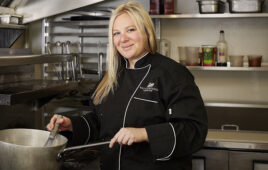Chad Myers, Executive Chef of Dubuque Golf & Country Club, is working to improve his management skills and thus his club’s culinary operation.
What is it that makes a good or decent cook? What are the characteristics you look for in a new hire?
I generally start with the most basic requirement, that being that the individual has a pulse and is actually present in the interview. Once I’ve established that the person is, in fact, alive and interested in the position, I look at his or her background to see if he or she would pass a background check.
From there, I evaluate their skills and bring them in if they seem like they’ll be a good fit. In the early days of their position with us, I have to pay close attention to their character and purpose. Does she seem nice? Does he seem like a hard worker? Is she passionate? Can he be taught? Is she willing to listen? Is he too arrogant? Is she stubborn? Is he flexible? Is she independent?
These things will have a profound impact on an individual’s success in our kitchen.
After we get past all of that, what’s next?
I generally give new hires about a month to adjust to our pacing and kitchen organization as well as to gain an overall sense of comfort in the kitchen. I watch for how he or she organizes their station, if he or she pays attention to detail, has a sense of urgency and pride in the food we produce.
What do these things mean though?
Organization is the key to a good service. Mise en place is the backbone we rely on. How is each station set up? Are you ready for anything and everything? Have you gone down the menu and scrutinized every detail of every dish to figure out how much product is needed? And if you run out, what is your plan and where is it?
There is nothing I hate more than asking a cook if they are ready for service, getting a “Yes, Chef. All good!” Then on the second ticket, seeing that individual run back to the cooler, freezer, or dry storage for something they forgot.
Attention to detail means paying attention to the little things as they relate to the big things. Mediocrity thrives when details are lost. Maybe at chain restaurants, the focus is on turning tables, but here we care more about quality. Are the fries coming up at the last second as everything else gets done, or are you making extra batches and letting them sit in the window? Did you check the ticket to see that they wanted no cheese on their burger, or that the steak is medium, not medium-well? How about that banquet? Do you have all of your portions? Do you know when that food goes out?
Having a sense of urgency is knowing when it’s time to be relaxed and when it’s time to get into the zone and haul ass. By hauling ass I don’t mean running around like a chicken with your head cut off creating nothing but havoc and doing a whole lot of nothing. It means moving with purpose. Every movement, every reach, every turn has a purpose. You shouldn’t have to leave your station. You should be ready and your only goal should be to put out the best food possible.
This ties into a pride of food. We must strive to be our very best every service. Each member that eats our food should think it is the best dish they have ever had. And when there are mistakes, which are bound to happen, we must learn from those mistakes and make them right.
Most tenured chefs know all of this. It’s part of their culinary philosophy. But my question to you is how do you teach this philosophy and constantly keep it top of mind for even long-term employees? How do we make someone care as much as we care? Is that even possible?
I almost feel like a fraud sometimes. I know I can create great food, but when it comes to complete command of my staff, I am still learning and I’m eager to improve.
I’ve never had the pleasure of having mentors to show me how they run their kitchens. I have plenty of chefs I look up to and I have great chef friends in the industry who I truly respect. But everything I am as an Executive Chef, I have learned along the way. Honesty and patience, coupled with a strong work ethic are my biggest strengths. If you ask me something, I will talk about it. If there is a busy service going down, I’ll jump in and we will get it done.
But I shouldn’t have to have my hands on every plate of food. I have other responsibilities. And I have to trust that the people on my team can carry the operation when I can’t be there.
I am working to navigate these challenges and continue to grow as a leader so that we come out on the other side better than we were the day before. But in the meantime, I’m all for learning your tips and tricks.



